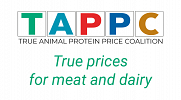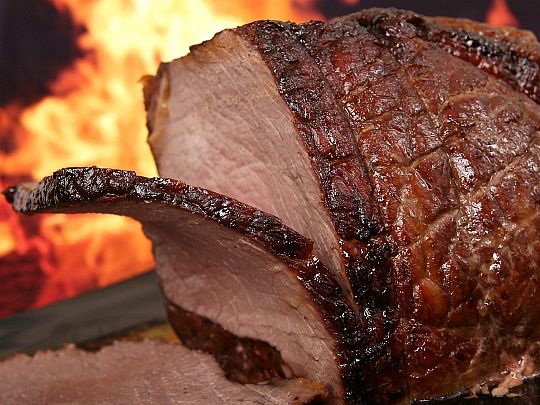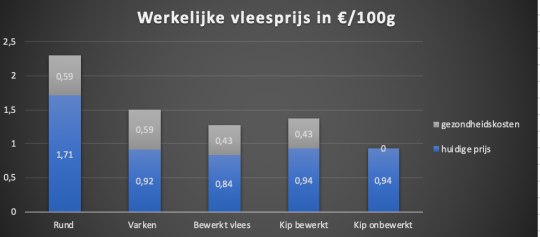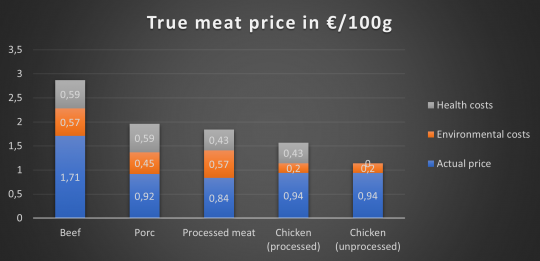Health costs 7.5 euros per kg red meat overconsumption
Research by WUR (Wageningen University) and ‘True Price’ shows that the health costs of meat consumption are considerable. For red meat, the WUR and ‘True Price’ estimate that the health costs in the Netherlands are around € 7.50 per kilo of overconsumption. For processed meat, the costs are around € 4.30 per kilo. It is the first time in a Dutch study that the health costs of meat consumption have been translated into costs per kilo for the meat on the supermarket. The research was presented in The Hague (House of Parliament newsroom) on April 11th. Here is the powerpoint presentation. (Dutch).
It has been known for some time that excessive consumption of red and processed meat is associated with an increased risk of cardiovascular disease, stroke and colon cancer. For processed meat, it is not even possible to indicate a 'safe' amount for intake, it is not included in the Dutch Dietary Guidelines for healthy food (Wheel of Five). For red meat, the assumption for overconsumption is based on an advice of about a quarter of current consumption.
The study looked at the medical costs of the diseases related to meat consumption. These costs, € 0,65 billion per year, are now carried by society as a whole and through the ever-increasing health care premiums for everyone. If the costs were to be passed on to the consumer as a user, the price per kilo in the supermarket would – in case of overconsumption – rise by € 7.50 (red meat) and € 4.30 (processed meat). This is a conservative estimate, which does not include the health costs associated with meat production, such as infectious animal diseases, nitrogen emissions and particulate matter. The costs of the loss of work associated with illness have also not been taken into account, as have health problems caused by poor preparation of meat (salmonella and campylobacter infections). The research was commissioned by the Dutch Vegetarian Association and the True Animal Protein Price Coalition (TAPP Coalition). Previously, these organizations had research carried out into the costs of environmental impact per kilo of meat. The average costs for this were € 5.70 (beef and processed meat), € 4.50 (pork) and € 2.00 (chicken) per kilo. Based on this, the TAPP Coalition has made various proposals for the introduction of a fair meat price (environmental tax on meat) with compensation for sustainability for farmers, a plan for making healthy food cheaper and compensation for lower incomes. According to research agency CE Delft, meat consumption would halve in 2030 at these prices.
Added up, the environmental and health costs would lead to a higher kilo price of € 13.20 for beef and € 10.00 for processed meat, approximately doubling the current price of red and processed meat. However, such a price increase is not currently on the agenda. The TAPP Coalition, the Vegetarian Association and Caring Doctors do support the recent proposals from the report by Rob Jetten (IBO report on pricing climate policy). This report also refers to a levy on meat and dairy products. This includes the same rates for meat as in the TAPP plan. The organizations call on the cabinet and parliament to include the (climate) levy on meat and dairy from the IBO report in the package of measures that will be presented in May for the 2030 climate goals. But then in conjunction with a 0% VAT and other price reductions for healthy and sustainably produced food, so that food prices do not rise on average. A 'fair, on average 40% higher meat price', in which farmers are paid for greening, healthy and sustainable food receives a 0% VAT rate and low incomes are compensated, enjoys broad support among the population. In a representative survey conducted by Ipsos in February 2023 among 1038 people, 57% of them were in favor of this fair meat price.
The report was presented on Tuesday evening April 11th. It was presented to Renze Brouwer (Ministry of Agriculture, Nature and Food Quality, program manager National Protein Strategy). Responses followed from among others Tjeerd de Groot (D66), Eva van Esch (PvdD) and Thomas Plochg (director of the Federation for Health).
Founded in 1894, the Vegetarian Association is the expert in the field of vegetarian nutrition and issues the V-Label for vegetarian and vegan products for the Netherlands, which can now be found on more than 2000 packages in supermarkets.
The True Animal Protein Price Coalition (TAPP Coalition), is a new organization committed to paying the "true" price of food, including environmental, health and animal welfare costs, starting with meat and dairy, due to the highest urgency . The approximately 60 partners of the TAPP Coalition represent about 0.6 million people.
For more information:
TAPP Coalition Jeroom Remmers (director)
info@tappcoalitie.nl
06 22 40 77 12
Vegetarian Association Floris de Graad (director)
f.degraad@vegetariers.nl
06 28 07 18 32
True Price Michel Scholte (director)
michel@impactinstitute.com
06 16 50 58 27
WUR Willy Baltussen
willy.baltussen@wur.nl
070 335 81 7 1
The report and other relevant materials can be downloaded via this dropbox.
Table: meat price increase if health costs of meat overconsumption are passed on
(in euro cents per 100 grams) (see image above).
* Source IRI / GPA: average price (incl. promo) in Q2 2022 supermarkets (excluding discounters Aldi/LIDL, including online meat sales.
** Source: “Consumer health - Impact-specific module for true price assessment True pricing method for agri-food products”, WUR, December 2022. Overconsumption red meat 23 kg per capita/year, see page 14. Total red meat consumption 30 kg. Overconsumption of processed meat: 20 kg, see page 14, based on Global Burden of Disease study.





